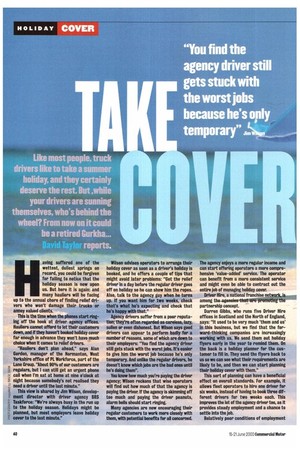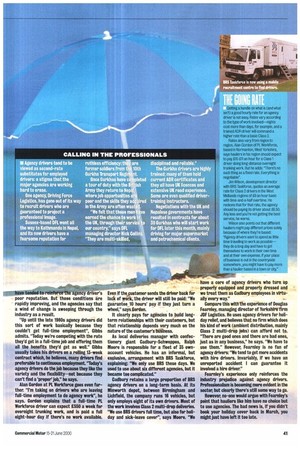Like most people, truck drivers like to take a summer
Page 42

Page 43

If you've noticed an error in this article please click here to report it so we can fix it.
holiday, and they certainly deserve the rest. But ,while your drivers are sunning themselves, who's behind the wheel? From now on it could he a retired Gurkha...
reports.
aving suffered one of the wettest, dullest springs on record, you could be forgiven for failing to notice that the holiday season is now upon us. But here it is again: and many hauliers will be facing up to the annual chore of finding relief dri vers who won't damage their trucks or annoy valued clients.
This is the time when the phones start ringing off the hook at driver agency offices. Hauliers cannot afford to let their customers down, and if they haven't booked holiday cover far enough in advance they won't have much choice when it comes to relief drivers.
"Hauliers don't plan ahead," says Alan Gordon, manager of the Normanton, West Yorkshire office of Pi. Workforce, part of the Lane Group. "About 90% of our customers are ,1 regulars, but I can still get an urgent phone 1F:51 call when I'm sat at home at nine o'clock at night because somebody's not realised they need a driver until the last minute."
.4 This view is shared by Jim Wilson, develop ment director with driver agency BRS
Taskforce: "We're always busy in the run up g to the holiday season. Holidays might be 18 planned, but most employers leave holiday T. cover to the last minute."
Wilson advises operators to arrange their holiday cover as soon as a driver's holiday is booked, and he offers a couple of tips that might avoid later problems: "Get the relief driver in a day before the regular driver goes off on holiday so he can show him the ropes. Also, talk to the agency guy when he turns up. If you want him for two weeks, check that's what he's expecting and check that he's happy with that."
Agency drivers suffer from a poor reputation; they're often regarded as careless, lazy, sullen or even dishonest. But Wilson says good drivers can appear to perform badly for a number of reasons, some of which are down to their employers: "You find the agency driver still gets stuck with the worst jobs. It's easier to give him the worst job because he's only temporary. And unlike the regular drivers, he doesn't know which jobs are the bad ones until he's doing them".
You know how much you're paying the driver agency; Wilson reckons that wise operators will find out how much of that the agency is paying the driver. If the agency is skimming off too much and paying the driver peanuts, alarm bells should start ringing.
Many agencies are now encouraging their regular customers to work more closely with them, with potential benefits for all concerned. The agency enjoys a more regular income and can start offering operators a more comprehensive 'value-added' service. The operator can benefit from a more consistent service and might even be able to contract out the entirejob of managing holiday cover.
Driver Hire, a national franchise network, is among the agencies that are promoting the partnership concept.
Darren Gibbs, who runs five Driver Hire offices in Scotland and the North of England, says: "It used to be very much 'them and us' In this business, but we find that the forward-thinking companies are increasingly working with us. We send them out holiday flyers early in the year to remind them. On the back is a holiday planner for the customer to fill in. They send the flyers back to us so we can see what their requirements are likely to be, and then we can start planning their holiday cover with them."
This sort of planning can have a beneficial effect on overall standards. For example, it allows fleet operators to hire one driver for six weeks, instead of having to book three different drivers for two weeks each. This improves the lot of the agency driver too, as it provides steady employment and a chance to settle into the job.
Relatively poor conditions of employment have tended to reinforce the agency driver's poor reputation. But those conditions are rapidly improving, and the agencies say that a wind of change is sweeping through the industry as a result.
"Up until the late 1980s agency drivers did this sort of work basically because they couldn't get full-time employment", Gibbs admits. "Today we're competing with the rate they'd get in a full-time job and offering them all the benefits they'd get as well" Gibbs usually takes his drivers on a rolling 13-week contract which, he believes, many drivers find preferable to continuous employment. "Today's agency drivers do the job because they like the variety and the flexibility—not because they can't find a 'proper' job," he says.
Alan Gordon at PL Workforce goes even further. "I'm taking on drivers who are leaving full-time employment to do agency work", he says. Gordon explains that a full-time PL Workforce driver can expect £550 a week for overnight trunking work, and is paid a full eight-hour day if there's no work available. Even if the customer sends the driver back for lack of work, the driver will still be paid: "We guarantee 10 hours' pay if they just turn a wheel," says Gordon.
It clearly pays for agencies to build longterm relationships with their customers, but that relationship depends very much on the nature of the customer's business.
As local deliveries manager with confectionery giant Cadbury-Schweppes, Ralph Moore is responsible for a fleet of 35 ownaccount vehicles. He has an informal, but exclusive, arrangement with BRS Taskforce, explaining: "We only use BRS these days. We used to use about six different agencies, but it became too complicated."
Cadbury retains a large proportion of BRS agency drivers on a long-term basis. At its Minworth depot, between Birmingham and Lichfield, the company runs 16 vehicles, but only employs eight of its own drivers. Most of the work involves Class 2 multi-drop deliveries. "We use BRS drivers full time, but also for holiday and sick-leave cover", says Moore. "We have a core of agency drivers who turn up properly equipped and properly dressed and we treat them as Cadbury employees in virtually every way."
Compare this with the experience of Douglas Fearnley, managing director of Yorkshire firm JLIF Logistics. He uses agency drivers for holiday relief, and believes that no firm which does his kind of work (ambient distribution, mainly Class 2 multi-drop jobs) can afford not to. "There are good ones and there are bad ones, just as in any business," he says. "We have to use them." However, Fearnley is no fan of agency drivers: "We tend to get more accidents with hire drivers. Invariably, if we have an unreported accident I can guarantee it involved a hire driver" Fearnley's experience only reinforces the industry prejudice against agency drivers. Professionalism is becoming more evident in the sector, but clearly there's still some way to go.
However, no-one would argue with Fearnley's point that hauliers like him have no choice but to use agencies. The bad news is, if you didn't book your holiday cover back in March, you might just have left it too late.












































































































